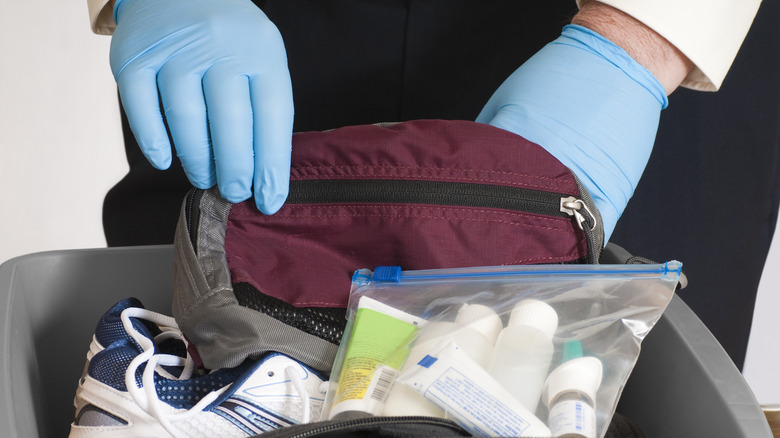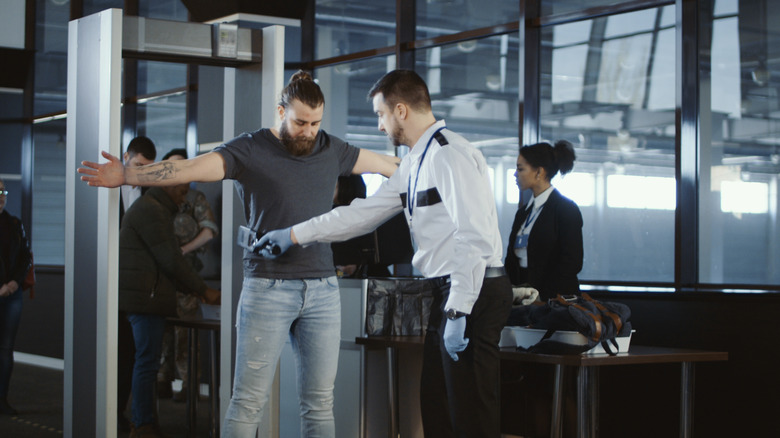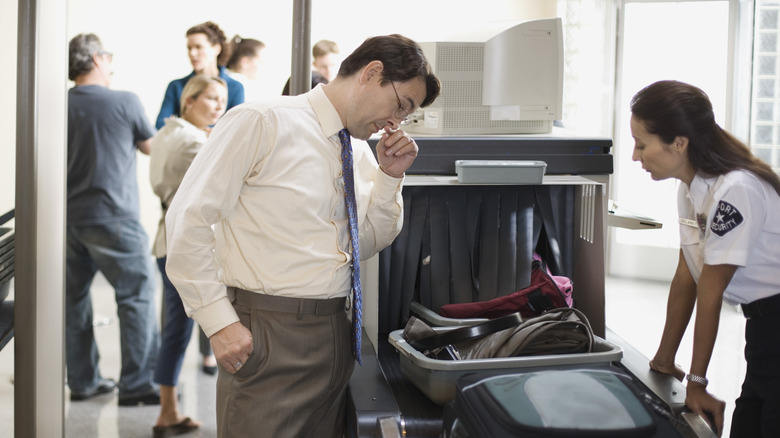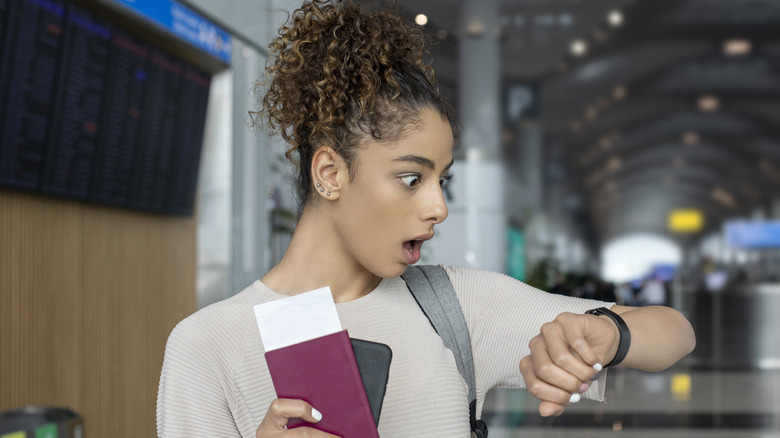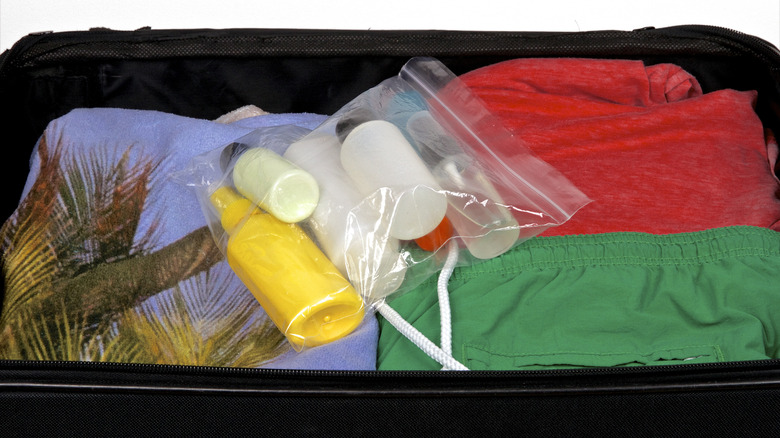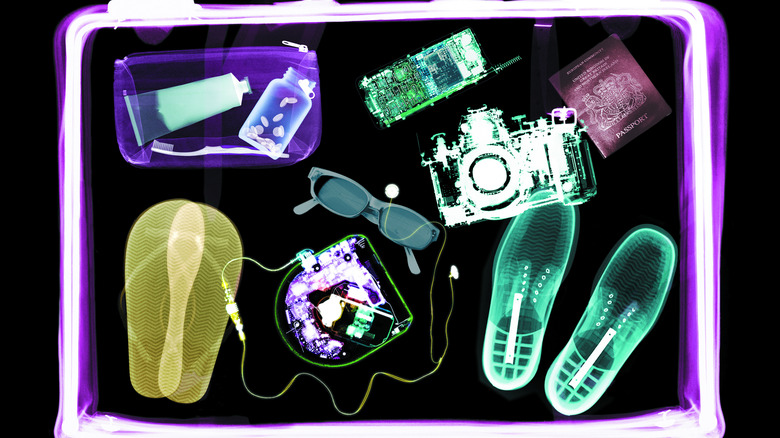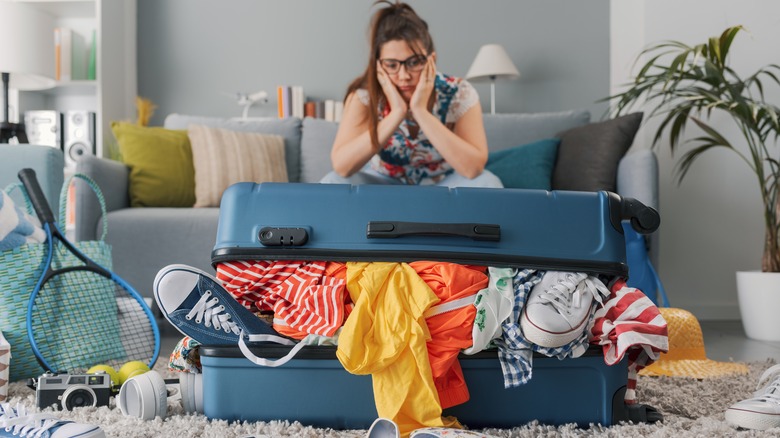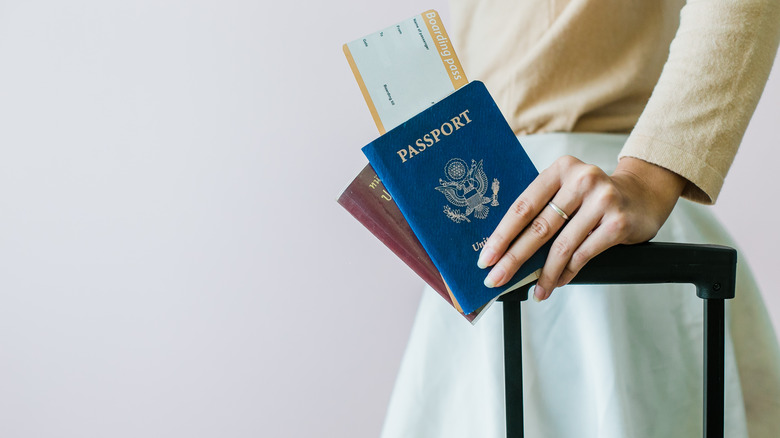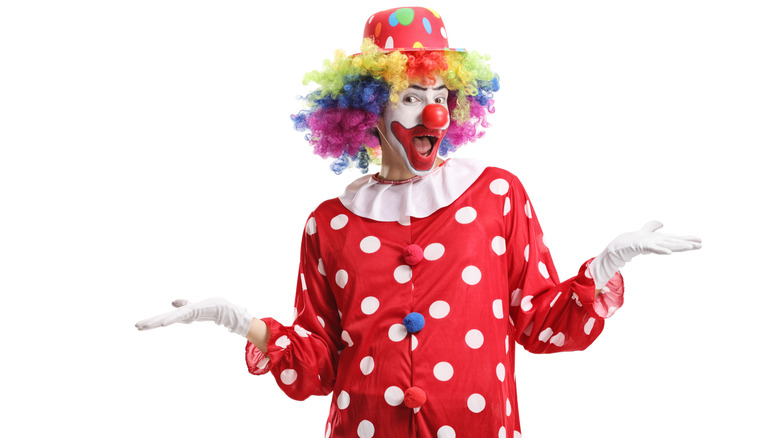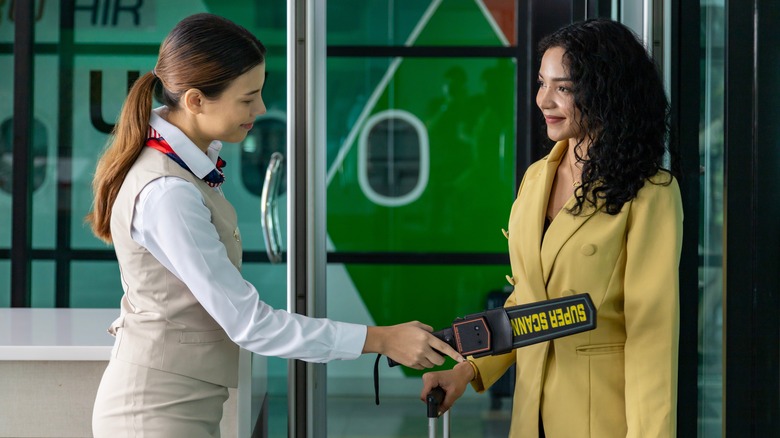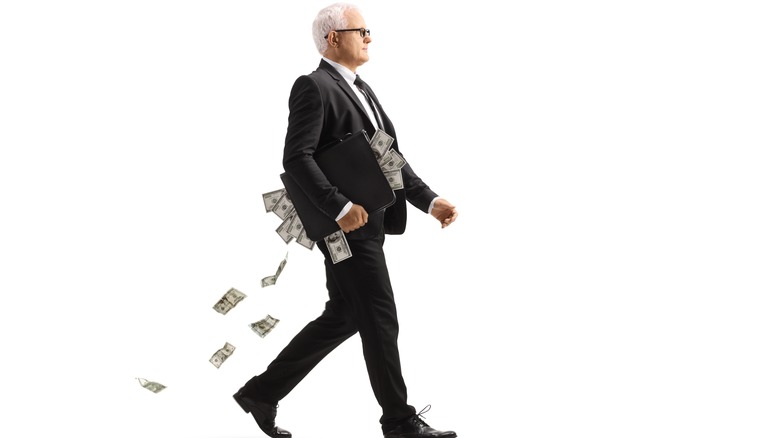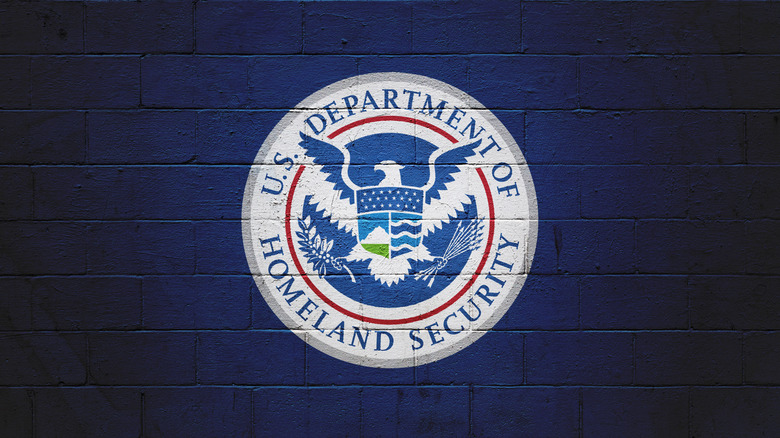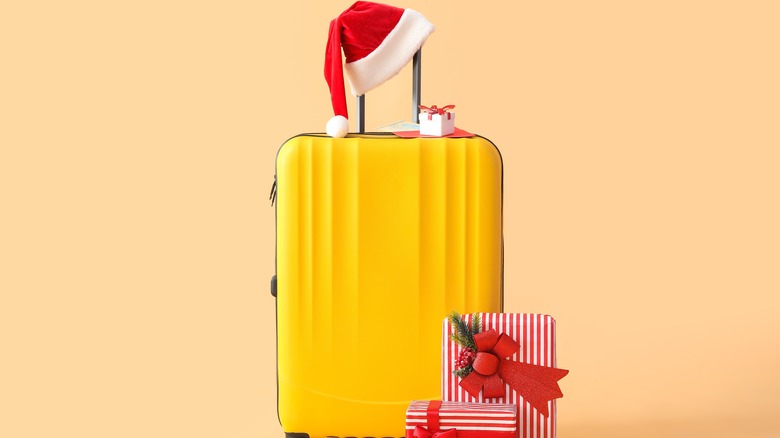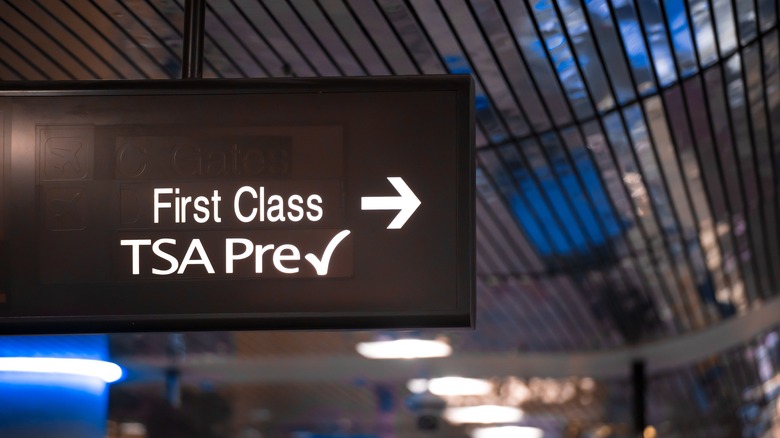The Best Tips To Avoid Getting Flagged By TSA
There's a joke about standing in line at TSA and being hit with a sudden panic that you accidentally packed drugs and weapons in your carry-on. It's ridiculous, of course, but the anxiety many people feel while waiting to pass through security is real. If you feel uncomfortable going through TSA screening, know you aren't alone. There are pages and pages of Reddit threads talking about it, with some helpful suggestions to quell the unease and other, er, less helpful comments. Wade in at your own risk! Common themes about what raises feelings of panic include the crowds, noise, and general feeling of disorganization.
There isn't too much you can do to control the chaos (a fact that makes it even worse for a lot of people), but you are in charge of your airport experience to a great extent. Part of it is putting yourself in the right mindset. The other part of the equation is knowing what to expect and how to avoid getting flagged for additional screening.
The TSA is there to protect you
The Transportation Security Administration was formed in 2001 in response to the September 11 tragedies. Its mandate is to prevent a similar attack from ever happening again. Yes, you may occasionally run into an agent who seems to be on a power trip, but the vast majority of TSA agents are just doing their job. The frontline agents don't make the rules (and may even think some of them are as silly as you think they are), but their job is to ensure that everyone follows those rules. Everyone. You know you are a good person, and bringing down an airplane is the opposite of what you want, but they don't, and that's the point of view they have been trained to hold. It may lead to inconvenience for you, but honestly, it's for your safety.
Besides being officious, another common complaint levied against TSA agents is that they yell. Raised voices can be triggering, but again, remember it's nothing personal. The agents are addressing a large group of people who mostly aren't paying attention. They need to make themselves heard, so a loud voice becomes the default.
Mind your manners
When going through security, you always have two choices: Follow the instructions of the agents and then board your flight, or don't. Arguing and making a scene won't get you through faster, but it could cause you to be subject to extra screening, be delayed and miss your flight, or worse, be barred from flying. Not only will it wreck your day, it could cause travel problems for you in the future.
In addition to inspecting your luggage for contraband, TSA agents are on the lookout for certain behaviors. Excessive complaining is one of them. If you are loud or rude or don't follow the directions the officer gives you, you are going to draw attention to yourself and mark yourself as someone who warrants a closer look. By being the calm, agreeable, compliant person you know you can be, you'll avoid branding yourself as a possible security threat. Don't give officers any extra reasons to pull you aside.
Pack your patience and your manners, and you'll be golden.
Give yourself plenty of time
One of the most stressful aspects of travel is the thought of missing your flight. If you aren't giving yourself ample time to get to the airport, clear security, and get to your gate, you are adding undue stress. Think about how you act when you're in a hurry — it's similar to how you act when you are nervous. TSA agents watch for people acting in peculiar ways. They don't know if you are sweaty and your eyes are darting because you are cutting it too close to boarding or because you are about to do something illegal. Channel your zen to avoid raising suspicion.
If you check in online, the airline often sends you a timeline with suggested times for getting to the airport, dropping off your luggage, and getting to the gate. These are usually very generous estimates, so if you stick with the timings, you should be fine. Bear in mind that checking in at the airline desk and dropping off bags takes more time than checking in online and traveling carry-on only. If you are traveling with kids, elderly people, or those with specific requirements, you should allow more time. If you are traveling internationally, you will need to be at the airport earlier than you would for a domestic flight. The MyTSA app posts estimated wait times at security checkpoints, as do some airports' websites, so you can know what you are in for.
Follow the 3-1-1 Rule
Some airports are loosening the liquids rule thanks to enhanced scanning technology, but presently, they are few and far between. For now and in the foreseeable future, The 3-1-1 rule remains firmly in effect. If you want to avoid having your bag flagged, make sure you follow it. The 3-1-1 rule refers to the limits on liquids, aerosols, and gels: each bottle must be 3.4 ounces or less, all your containers must fit in a 1-quart bag, and one bag is allowed per person.
The rule came into effect worldwide in 2006 following a foiled terrorist plot. Intelligence uncovered a plan by a nefarious group who planned to bring down several planes using liquid explosives brought aboard in water bottles. In the intervening years, CT technology has improved and now allows equipment operators to better identify liquids of concern, regardless of the volume. However, the scanning technology is expensive and staffing constraints are preventing the technology from being rolled out quickly.
For now, anything that can be poured, spread, or spritzed is counted towards your limits, although there are exemptions for medical needs and baby milk. If you forget or try to skirt the rules, you will be given the option to courier your things home, consume them on the spot, check them, or forfeit them.
Pack smart
TSA agents have a short amount of time to look at the X-ray image of your bag to determine if it needs a closer inspection. If everything is neat and easily identifiable, it makes their job that much quicker. The TSA website states: "To help TSA officers get a clear look at your bag and reduce the need for additional screening, we suggest you pack your bag in neat layers." Packing cubes can be your secret weapon for keeping your bag organized and may mean less re-packing if your bag gets pulled and searched. It's a good idea to check the TSA site for what can and can't be brought through TSA.
Things you purchase in duty-free stores usually get tucked into your carry-on and may trigger an extra look if it is liquid and over 3.4 ounces. The final say always goes to the TSA officer, but generally, as long as you have it in a secure, tamper-evident, duty-free bag and have the receipt stating it was bought within 48 hours, you'll be waved through just fine.
Check what must be checked
Opting to go carry-on only is a choice many travelers make, some due to the cost of checking luggage and others because of the convenience of keeping your bag with you and avoiding the baggage carousel at the other end. However, some items must go in your checked luggage. Know which those are, and you'll avoid getting flagged by TSA. If you are traveling with a power tool, it needs to go in the hold as checked baggage. (And we'd like to know more about your trip!) Firearms also require special handling and must be unloaded and in a locked, hard-sided case. When you are checking the item, it must be declared. Replicas, toy guns, firearm parts, and ammunition must also be checked.
Other things can only be brought on an airplane as carry-on. These are generally things that pose a danger if left in the hold where it won't be immediately obvious if a problem occurs. First and foremost, anything that is a fire risk goes in carry-on. Examples include power banks, spare lithium batteries, safety matches, and vape pens. Having a fire anywhere on a plane is obviously dangerous, but in the cabin, at least it can be extinguished quickly. Other things that need to be brought as carry-on are smart bags and avalanche rescue packs.
Keep your documents handy and up to date
You will need to show your boarding pass and identification when passing through security. There is a long list of acceptable government IDs you can use when traveling domestically in the U.S. You can find what ID is allowed on the TSA website. For TSA purposes, you may use an expired driver's license or state-issued identification card provided it hasn't been expired for longer than a year. Note that the airline may have different rules about ID for boarding, so make sure you talk to someone to make sure what you have is sufficient.
Starting May 7, 2025, the Department of Homeland Security is implementing REAL IDs. This is designed to standardize the security of driver's licenses and state IDs nationwide. Once the program is implemented, your driver's license must be REAL ID compliant if you want to use it to travel.
To avoid getting flagged, it's important to have the correct name on your boarding pass and ensure it matches your ID. Shortened or diminutive forms of your name are generally not acceptable; Steve and Steven are not the same in the eyes of the TSA. If you recently changed your name, bring the legal documentation for backup. Kids under 18 don't have to bring ID for TSA.
Don't confuse airports with comedy clubs
Keeping it light and making jokes about innocuous things are fine, but talking about drugs, explosives, or violence has no place at the airport. Making a false report of a bomb, arson, or weapon of mass destruction is a second-degree felony no matter where in the U.S. someone does it. At an airport, you can guarantee it's not going to be laughed off. TSA can't assume that you are just kidding around and have to treat even what you might see as an obvious joke as a credible threat.
Airports and authorities don't publish their operating procedures for security threats for obvious reasons, but lockdowns or evacuations are standard for emergencies in public places. You don't want to be the reason for that, no matter how funny your joke might be.
In February 2024, a man found out the hard way when his joke about having a bomb in his bag fell flat at the Fort Lauderdale-Hollywood airport. While seated on the runway, the man told a flight attendant that TSA had missed the bomb in his bag. NBC Miami reports that, in a surprise to no one, authorities were called, and the man was arrested and escorted off the plane to face charges. Take this as your reminder: Don't try out your comedy routine at the airport, don't prank your friend, and don't think you are funny if you make one little explosives joke. Just don't.
Dress for security success
Entering an arena, theme park, or even some schools entails walking through a metal detector or having a guard scan you with a wand. It all might feel habitual, but there is something about airports that can make even ordinarily very sensible people lose their bearings. If you are hoping to skip the extra screening at TSA, you need to dress for it.
Avoid clothes with hidden pockets and metal adornments. If you need to accessorize your traveling outfit, make sure it is stuff you can remove easily. Thin chains and small piercings aren't likely to alarm, but they may. If you are going through a full-body scanner, swing your necklace to the back so they can get a better picture.
Depending on the airport, you may need to take off your shoes. Assume you do, but understand that there are different protocols. Sometimes, you can wear your footwear through. Other times, you need to remove anything that covers your ankles or higher (high tops, booties, or boots), and sometimes all footwear has to come off. Follow the directions of the agent. Don't say, "But I didn't have to in Atlanta!" if you are in Boston. That doesn't actually matter. Just make sure you wear socks.
Leave your stacks of cash at the bank
Most countries regulate how much cash you can bring into the country. For example, according to the Canadian Border Services Agency, there is no limit for bringing money into Canada, but if you have cash or "monetary instruments" worth more than $10,000 CAD, you must declare them. Not declaring may result in fines of 5 to 50% of the total value. Coming into the U.S., there are similar regulations on currency worth more than $10,000 USD for individuals or family groups traveling together.
While there are no limits on the bucks you can bring when flying domestically in the U.S., a large amount of cash can seem suspicious and trigger an agent to flag you for extra screening. TSA may want to talk to you about how and why you have such an abundance of cash. If the agent suspects the money is the result of a criminal activity (like drug trafficking or money laundering), they can refer the matter to the police.
Understand DHS TRIP and Redress Control
If you are consistently selected for secondary screening or have to go to the check-in desk for your boarding pass because you can't print it from home, there may be something going on behind the scenes that is triggering extra security protocols. A typical example is that you have the same or similar name to someone who is on a watchlist. In this case, you need to apply for a redress control number.
Officially called the Department of Homeland Security Traveler Redress Inquiry Program (DHS TRIP), the program is a way for travelers with watchlist issues or who have faced trouble with screening at American transportation hubs, including repeatedly being referred for secondary (enhanced) screening.
Travelers submit a form through an online portal and are assigned a seven-digit redress control number. If their application is successful, that number can be used when making an airline reservation to avoid some of the headaches at the airport.
Don't gift wrap coffee
Coffee beans have been used to cover the smell of illicit substances and confuse security dogs. As such, carrying coffee has now become worthy of extra scrutiny. It's a classic case of a few bad apples ruining it for the whole bunch. This isn't to say you can't bring coffee through TSA; just be aware that it might warrant a second look at screening. And if you happen to be bringing powdered creamer to go with the coffee (or any other powder or "powder-like substance"), you may want to put it in your checked luggage. While it's permissible to bring it aboard as carry-on luggage, if you have more than 12 ounces, you have to put it in a separate bin at security. The TSA agent could mark it for additional screening, which may involve opening the container.
Gift-wrapped packages are also a flag because their contents aren't easy to see. The TSA recommends you keep your packages unwrapped for travel. If your presents are deemed to need a closer look, you will have to unwrap your package. To avoid problems, ship your packages and coffee instead of bringing them with you or use gift bags you can easily open.
Get TSA PreCheck
The TSA website has published plenty of travel tips, including why you may want to explore applying for TSA PreCheck. It's one of the best ways to get through security without being flagged by the TSA.
You may have watched in envy while a select few glide through the short lane to the head of the line at TSA. They aren't VIPs or people who "know someone" at the airport (although that's also possible). They are travelers who have opted to pay for and have passed the vetting process known as TSA PreCheck. Under TSA Secure Flight, airline passengers are assessed for high or low risk well before they ever get to the airport. Based on watchlists and trusted traveler lists, some travelers are assigned to a Selectee List for enhanced screening. Those with TSA PreCheck are considered low-risk and screened accordingly.
To apply, you can fill out the form online or in person at a service provider. After you submit the application, you will need to be fingerprinted and photographed. Once your application is complete, you will be assigned a Known Traveler Number (KTN), which you can add to your airline reservations, indicating you have been through the process. In 2024, it costs between $78 and $85 and is good for five years.
